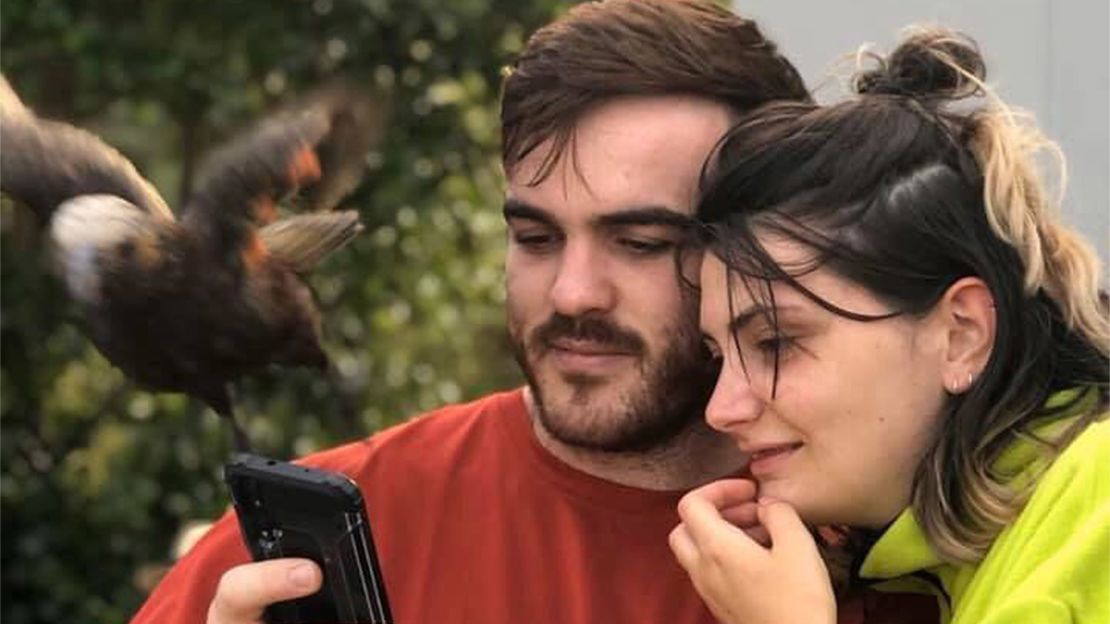Henny Ansell is effectively in a long-distance relationship with her boyfriend – but her boyfriend is only a few miles away.
Ansell and Michael Bryan live in Wellington, the harbor-side capital of New Zealand. For the next four weeks – at least – the couple won’t be able to see each other in person.
That’s because the country is in lockdown in a bid to stop the spread of Covid-19.
“At first, we didn’t really understand the rules – we kind of thought, it will be fine, we’ll be able to see each other once or twice a week,” says 25-year-old Ansell, who has been with her boyfriend for five years. “And then it kind of dawned on us that that’s probably not good.”
Bryan invited her to stick out the lockdown in his flat, but another flatmate’s girlfriend was already staying. Besides, she wanted to be at her own place – and it was a bit small for him to stay with her.

So instead, the couple – who met while working at a local pizza chain – will spend the next few weeks chatting virtually, even though they live around 8 kilometers (5 miles) apart. They already text each other good morning and good night, but instead of in-person hang outs, their immediate future looks set to feature constant texting and watching Netflix shows together but apart.
“It’s very tempting (to meet up), and it’s frustrating because it’s like, oh surely we could just meet up and hug,” Ansell says. “But you can’t – that destroys the whole purpose of it.”
As countries impose strict lockdown measures and travel restrictions to combat the coronavirus pandemic, couples all over the world are facing similar predicaments. While some – like Ansell – are choosing to stay apart, others have found coronavirus has brought them closer together.
The question of how couples should handle lockdowns is so widespread that it was even brought up at a press conference last week with Jenny Harries, the United Kingdom’s deputy chief medical officer.
“I’m clearly going to start a new career here in relationship counseling, so I shall tread very carefully as I work through this answer,” quipped Harries. “Test really carefully your strength of feeling, stay within the household either together or apart. But keep it that way.”
Together, apart
On the other side of the world in the United Kingdom, 21-year-old James Marsh and his girlfriend Kiera Leaper were due to celebrate their one-year anniversary on Monday.
Instead, the country went into lockdown.

The pair – who study together at the University of Leeds – had seen it coming. When it looked like the country could go into lockdown, the pair squeezed in one last hangout before Marsh retreated to his family home at the opposite end of the country from Leaper. The lockdown is set to continue for at least three weeks.
“We normally see each other every day, we stay with each other pretty much every night,” Marsh said. “To go from that to this is obviously quite a big change.
“This will be the longest time we’ve gone without seeing each other since we’ve been officially together.”
So far, the couple have FaceTimed every day, and spend time together with their friends on online video chat platform Houseparty. They’re trying to keep busy – Marsh with his course work, and Leaper with exercise.
But there are challenges. Marsh and many of his friends are in the final months of their three-year undergraduate degrees, and they’re sad they won’t get to celebrate together. “We’ll just sort of go away with coronavirus being the memory of our third year,” he said.
And while technology was helpful for keeping Marsh and his girlfriend connected, it wasn’t the same as being in the same room, he said.
Even so, he thinks this time apart will strengthen their relationship.
“I think it’s really important to be able to tackle stuff like this … you can’t always just rely on that person being there if you want to stick it out for the long haul,” Marsh said.
“You might get a job that requires you to go away for work or stuff like that, and you can’t have a dependency on that person in that case.”
Secret love
Hemangay, a University of Delhi student, hasn’t heard his boyfriend’s voice for about a week.
The 19-year-old, who asked not to use his real name as he is not out to his parents, lives with his family in New Delhi, the capital of India. For the past few months, he’s been dating his 22-year-old boyfriend – in secret.
On Tuesday, India’s Prime Minister Narendra Modi announced that the country of 1.3 billion was going into lockdown for the next 21 days.
That means no one is allowed outside. Public transport is shut, so Hemangay wouldn’t be able to make it to his boyfriend’s house on the other side of Delhi, anyway.
And because Hemangay can’t take walks, he hasn’t been able to phone his boyfriend – he’s too worried that his parents would find out about their relationship if he calls him from the family home.
“I’m still a student, I’m not that independent that I can go out and survive my life on my own terms,” he said. “Once I become independent, then maybe I can take that risk.”
“Since I’m not out with my family, I just can’t openly contact him or chat with him,” he said. “It’s really tough for us to communicate.”
So for the next few weeks at least, one of the only ways they can communicate is messaging over WhatsApp. It’s a far cry from their normal lives, when they would meet up almost every day afteruniversity. Hemangay last saw his boyfriend two weeks ago, before the measures – and they had no idea what was to come. “That is the worst part about this, that I didn’t know this would be the last time,” he said.
Hemangay is dreading the next few weeks of separation, but he knows there’s nothing he can do.
“I have never felt so helpless in my entire life,” he said.
Love in a time of uncertainty
April was meant to be the light at the end of the tunnel for Isobel Ewing, 30, who has been in a long distance relationship with her boyfriend.
Ewing, a broadcast journalist, moved to Budapest, Hungary in mid-January. She had been looking forward to April, when she would see her boyfriend of almost two years, Sam Smoothy, for the first time in months. A professional skier, Smoothy had been in North America for a few months, and had planned to come and spend time with her in Hungary.
But coronavirus has thwarted those plans.

After United States President Donald Trump announced on March 11 that he was banning travel from continental Europe to the US, they became afraid Smoothy would get stuck in North America.A few days later, Hungary closed its borders to foreigners, meaning Smoothy could no longer visit.
That meant Smoothy was forced to go back to New Zealand instead of Hungary – and their plans were on hold.
Now, Smoothyis in New Zealand, self-isolating at Ewing’s family holiday home. Ewing needs to stay in Budapest for work. She works from her Budapest apartment, and goes for runs in the hills and alongside the Danube River. They don’t know when they’ll be able to see each other again.
“With long distance you get used to being apart,” Ewing said. “But it’s so key to have that time together to look forward to. And then to just have that plucked out from under us … I’m kind of still processing it.”
Moving faster
For three years, Anika, 32, has wanted to marry her partner, but things outside their control kept getting in the way.
Finally, the New Delhi-based couple set their dates. They would register their marriage in court on March 20, hold a big dance party on April 10 with 400 people, and then have the wedding ceremony on April 12.
Then the coronavirus outbreak happened.
As the Indian government began taking more measures – including suspending all tourist visas – the couple grew more worried about their wedding. Anika, who asked not to use her real name for privacy reasons, started thinking of a plan B.
As the situation evolved, their wedding plans kept changing. Finally, with only days to spare, they decided they would get married on March 20, and hold a small ceremony after the court proceedings.
“That entire week was pretty traumatic,” she said, adding that they ended up uninviting guests to keep numbers down to 30 or so people for social distancing purposes. “We were sending last minute messages just apologizing to people.”
In the end, it was a sweet, intimate wedding, Anika says. There were nods to the crisis unfolding outside – the couple updated their wedding hashtag to #loveinthetimeofcorona, and kept sanitizing and fumigating the space.
“Sometimes it’s destiny,” she said. “At that time yes, you feel stressed and disappointed. But now in retrospect, I think it was perfect.”
Even though it wasn’t the wedding they had dreamed of, Anika and her husband didn’t want to postpone it. In India, it’s not culturally acceptable for couples to live together before marrying. Now, the pair have gone straight into life together – under lockdown.
“We had been seeing each other for a really long time, we’d been planning this wedding for a really long time,” she said.
“We didn’t want to postpone it again. What if something else went wrong? What if nothing changes? We wanted to start our lives together – we didn’t want to wait.”





